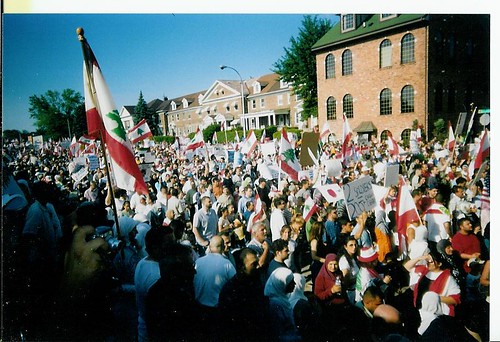
Dearborn Demonstration to Support Lebanon & Palestine: PANW Photo, July 18, 2006, a photo by panafnewswire on Flickr.
November 29, 2011
Restraint Urged After Salvos Over Lebanon-Israel Line
By ISABEL KERSHNER
New York Times
JERUSALEM — The United Nations peacekeeping force in Lebanon called for “maximum restraint” on Tuesday after an exchange of fire over the Israel-Lebanon border overnight.
Rockets fired from southern Lebanon struck northern Israel for the first time since 2009, and the Israeli military responded by firing artillery shells at the area where the rockets were launched.
Though the exchange was relatively small in scale and there were no reports of casualties on either side, it punctured months of quiet along a notoriously volatile border at a time of regional turmoil and rising tension between Israel and Iran over Iran’s nuclear program.
“This is a serious incident, in violation of U.N. Security Council Resolution 1701, and is clearly directed at undermining stability in the area,” the commander of the peacekeeping force, Maj. Gen. Alberto Asarta Cuevas, said in a statement.
It was not immediately clear which group was responsible for the rocket fire from Lebanon. Some news outlets reported that a little-known group had made a claim of responsibility.
Hezbollah, a Shiite militant organization in Lebanon that is backed by Iran and Syria, fired thousands of rockets at Israel during a 34-day war in 2006 that left more than 1,000 Lebanese and several dozen Israelis dead. The United Nations peacekeepers’ mission has been helping Lebanese troops monitor the fragile cease-fire underpinned by Resolution 1701, which ended that conflict. Israel and Lebanon have no diplomatic relations.
Any indication of Hezbollah involvement in the latest rocket fire would signal a more serious risk of an escalation of violence. But several small Palestinian and other militant groups that operate in southern Lebanon have also fired rockets at Israel in the past.
The Israeli military said on Tuesday that it viewed the incident gravely, but officials said they considered it to be over.
Hezbollah has emerged as the kingmaker in Lebanese politics. Israeli officials point to reports that Hezbollah has been transferring weapons to Lebanon from warehouses in Syria because of the political upheaval threatening the Syrian government of President Bashar al-Assad.
During the 2006 war, most of the rockets fired into Israel were short-range Katyushas, which could do little damage. But Israeli military officials say that Hezbollah has since built up a larger and more lethal arsenal, storing up to 40,000 rockets in bunkers in southern Lebanon. And Israel accused Syria last year of providing long-range Scud missiles to the militia, a claim denied by Syria and by Lebanese officials.
“Syria’s determined support of Hizballah’s military buildup, particularly the steady supply of longer-range rockets and the introduction of guided missiles, could change the military balance and produce a scenario significantly more destructive than the July-August 2006 war,” said a 2009 cable from the American chargé d’affaires in Damascus that was obtained by WikiLeaks.
Ron Ben-Yishai, an analyst for Ynet, a popular Israeli news site, wrote on Tuesday that the nighttime fire across Israel’s northern border “could be defined as a localized incident of no apparent strategic significance.”
“Nevertheless,” he continued, “given the extremely unstable conditions now prevailing in the Middle East, such an incident could lead to a deteriorating situation even if the main players, Israel and Hezbollah, did not intend for that to happen.”
No comments:
Post a Comment